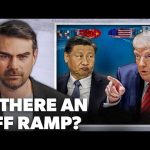In a bizarre twist of rhetoric, Russian President Vladimir Putin has launched a dual assault on Ukraine, branding it both a “Nazi regime” and a “wild hotbed of social leftism.” This juxtaposition is not only confusing but also reveals the absurdity of claims that lack substantial backing. Holding two diametrically opposed accusations raises questions about the credibility of the source. In the case of Putin, a leader whose own government has a history of suppressing dissent and manipulating facts, these claims ring hollow.
First, let’s unpack the notion that Ukraine is a Nazi regime. The accusation becomes absurd when contrasted with the identity of many Ukrainian citizens, including the family of a rabbi who recently met with an official — an event that showcases the diversity of Ukrainian society. This rabbi’s son is fighting in a war, presumably to defend his homeland against the very aggression that Putin is instigating. If Ukraine were truly a Nazi regime, would this young man be risking his life in service to such an ideology? It’s not just inadequate; it’s downright ludicrous.
Furthermore, this claim doesn’t hold up in the face of the realities on the ground. Ukraine has a president who is Jewish and whose government includes a range of political opinions, including those of liberals, conservatives, and moderates. The idea of a cohesive Nazi regime existing in a country characterized by its diverse leadership and open civil society is an insult to the intelligence of anyone paying attention. Even casual observers can see that these labels are simply a smokescreen, an attempt by Putin to delegitimize a nation fighting for its sovereignty.
Now, how about the accusation that Ukraine is a hotbed of social leftism? If one looks at the country’s political landscape, it is evident that the reality is much more complex. Ukraine, like many nations, has a variety of social movements and political opinions. However, labeling it as a bastion of leftist ideology seems more like a projection of Putin’s own fears and insecurities. It suggests an inherent misunderstanding of Ukraine as a nation striving to carve out its own identity separate from Russian influence. Clearly, such a claim is simply fodder for propaganda.
Putin’s conflicting narratives serve a purpose, but it ultimately comes off as a poorly written play that fails to convince its audience. The truth is, these accusations are not just wrong; they are symptomatic of a desperate regime that is attempting to justify its aggression. By flinging around terms like “Nazi” and “leftist,” Putin is masking his own authoritarianism while simultaneously trying to instill confusion and fear.
In conclusion, the rhetoric coming from the Kremlin on Ukraine is both troubling and entertaining in its contradiction. It raises eyebrows and ignites a sense of disbelief. As the world watches, one thing becomes clear: these claims are nothing more than hollow attempts to paint a false narrative. Ukraine is fighting for its freedom and identity against a tyrant who is desperately trying to rewrite reality. In a game of political chess, it is evident who is playing with the black pieces and who is simply trying to fight for the light.




